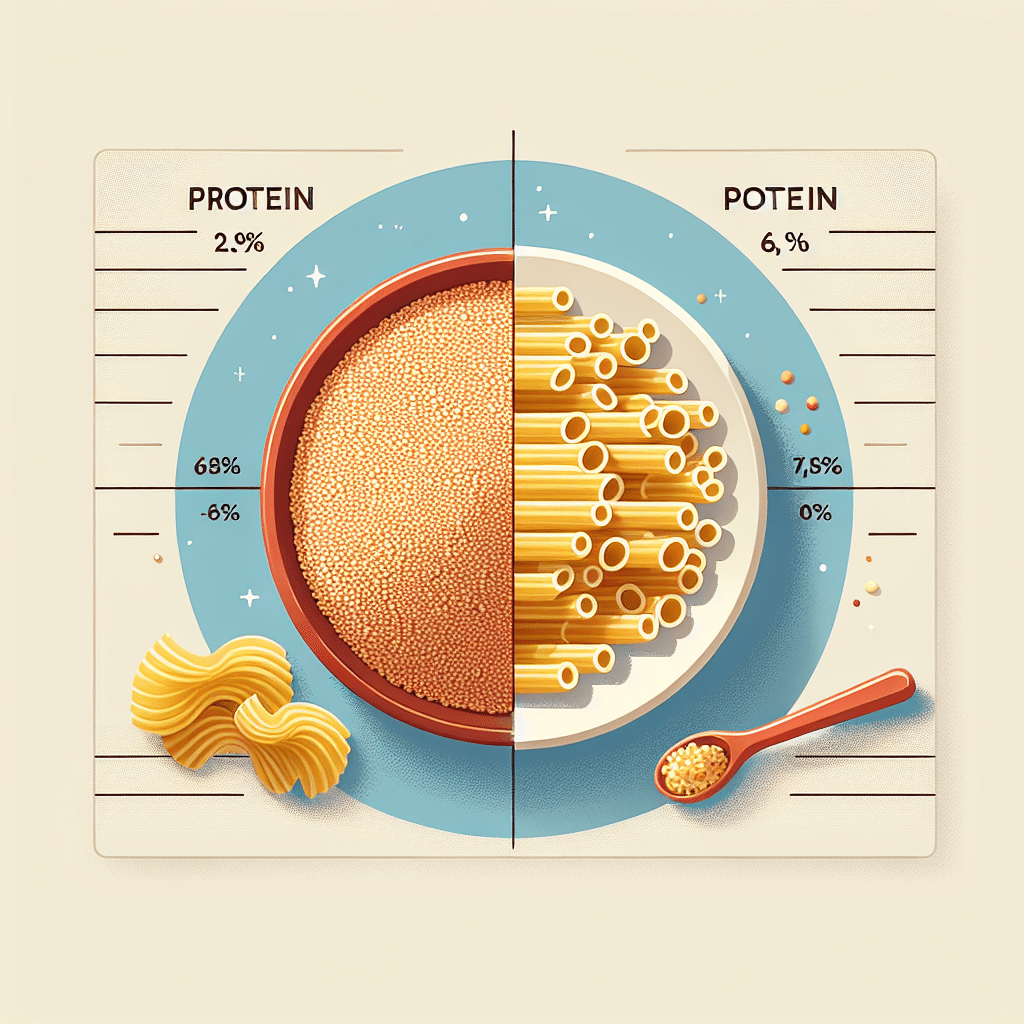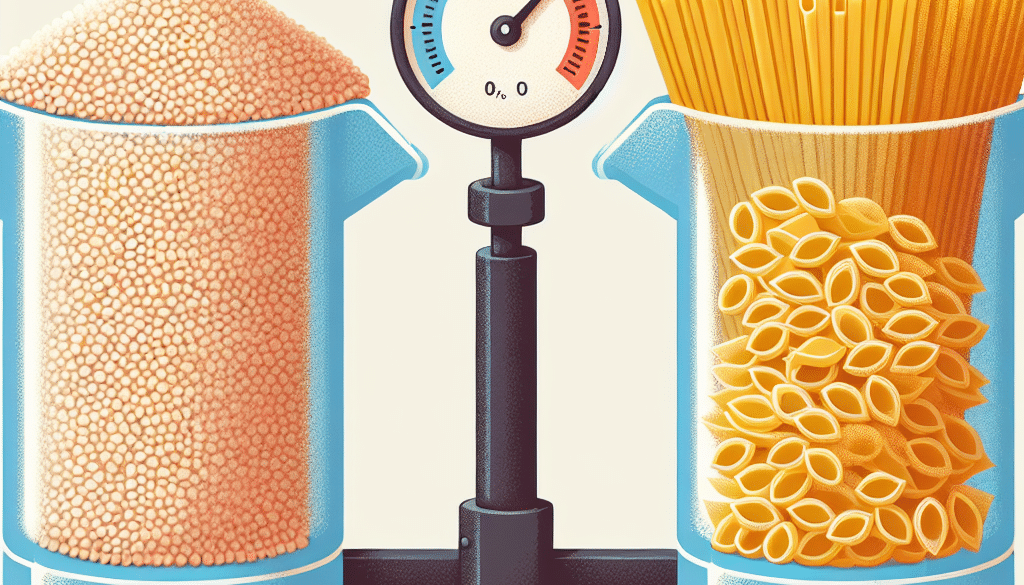Does Quinoa Have More Protein Than Pasta?
-
Table of Contents
- Quinoa vs. Pasta: A Protein Comparison for Health-Conscious Eaters
- Understanding Protein in Our Diet
- Quinoa: A Complete Protein Source
- Pasta: A Popular Carb-Heavy Staple
- Comparing Protein: Quinoa vs. Pasta
- Nutritional Benefits Beyond Protein
- Practical Considerations for Your Diet
- Conclusion: Quinoa Takes the Protein Crown
- Discover ETprotein’s High-Quality Protein Products
Quinoa vs. Pasta: A Protein Comparison for Health-Conscious Eaters

When it comes to choosing healthy foods, protein content is often a significant factor for many individuals. Quinoa and pasta are two popular staples in various diets around the world, but they differ greatly in their nutritional profiles. This article delves into the protein content of quinoa compared to pasta, exploring which one packs a more substantial protein punch and why it matters for your health.
Understanding Protein in Our Diet
Protein is a macronutrient essential for building and repairing tissues, making enzymes and hormones, and supporting immune function. It’s a vital component of every cell in the body, and a lack of protein can lead to muscle wasting, weakened immunity, and other health issues.
Quinoa: A Complete Protein Source
Quinoa is often hailed as a superfood due to its impressive nutritional profile. It’s a whole grain that is naturally gluten-free and rich in fiber, vitamins, and minerals. Most notably, quinoa is considered a complete protein, meaning it contains all nine essential amino acids that the body cannot produce on its own.
- High in Protein: Quinoa contains approximately 8 grams of protein per cooked cup (185 grams).
- Essential Amino Acids: It provides a balanced set of essential amino acids, making it an excellent protein source for vegetarians and vegans.
- Rich in Fiber: With about 5 grams of fiber per cup, quinoa can help improve digestion and satiety.
Pasta: A Popular Carb-Heavy Staple
Pasta is a beloved dish worldwide, known for its versatility and comforting nature. Traditional pasta is made from wheat and is high in carbohydrates. While it does contain protein, it’s not as protein-dense as quinoa.
- Protein Content: A typical serving of cooked pasta (about 140 grams) contains roughly 7 grams of protein.
- Refined vs. Whole Grain: Whole grain pasta can offer more nutrients and fiber compared to its refined counterpart.
- Enriched Options: Some pastas are enriched with additional nutrients, including protein, but they may still lack the full spectrum of essential amino acids.
Comparing Protein: Quinoa vs. Pasta
When directly comparing the protein content of quinoa and pasta, quinoa emerges as the clear winner. Not only does it have a higher protein content per serving, but the quality of its protein is superior due to its complete amino acid profile.
- Protein Quality: Quinoa’s protein is more bioavailable and beneficial for muscle growth and repair.
- Protein Quantity: Per serving, quinoa generally offers more protein than pasta, especially when comparing equal calorie servings.
- Dietary Needs: For those on plant-based diets, quinoa provides an essential source of complete protein.
Nutritional Benefits Beyond Protein
While protein is a crucial factor, it’s not the only nutritional consideration. Quinoa and pasta both have unique benefits and can be part of a balanced diet.
- Quinoa is rich in antioxidants, magnesium, iron, and B-vitamins.
- Pasta can be a good source of energy due to its carbohydrate content, especially when chosen in its whole grain form.
- Both can be part of a healthy diet when consumed in moderation and as part of a meal balanced with vegetables and lean proteins.
Practical Considerations for Your Diet
Choosing between quinoa and pasta may come down to personal dietary goals and preferences. If you’re looking to increase your protein intake, quinoa is the better option. However, pasta can still fit into a high-protein diet when paired with other protein sources like meat, fish, or legumes.
Conclusion: Quinoa Takes the Protein Crown
In the debate of quinoa versus pasta for protein content, quinoa stands out as the superior choice. With its higher protein content and complete amino acid profile, quinoa is an excellent addition to any diet, particularly for those seeking plant-based protein sources. While pasta remains a delicious and versatile food, those mindful of their protein intake might opt for quinoa as a more nutritious alternative.
Discover ETprotein’s High-Quality Protein Products
If you’re looking to enhance your diet with high-quality protein sources, consider exploring ETprotein’s range of organic bulk vegan proteins. Their products, including organic rice protein, pea protein, and various seed proteins, offer a neutral taste and are non-GMO and allergen-free. With L-(+)-Ergothioneine purity over 98%, ETprotein caters to a diverse range of industries and dietary needs.
About ETprotein:
ETprotein, a reputable protein and L-(+)-Ergothioneine (EGT) Chinese factory manufacturer and supplier, is renowned for producing, stocking, exporting, and delivering the highest quality organic bulk vegan proteins and L-(+)-Ergothioneine. They include Organic rice protein, clear rice protein, pea protein, clear pea protein, watermelon seed protein, pumpkin seed protein, sunflower seed protein, mung bean protein, peanut protein, and L-(+)-Ergothioneine EGT Pharmaceutical grade, L-(+)-Ergothioneine EGT food grade, L-(+)-Ergothioneine EGT cosmetic grade, L-(+)-Ergothioneine EGT reference grade and L-(+)-Ergothioneine EGT standard. Their offerings, characterized by a neutral taste, non-GMO, allergen-free attributes, with L-(+)-Ergothioneine purity over 98%, 99%, cater to a diverse range of industries. They serve nutraceutical, pharmaceutical, cosmeceutical, veterinary, as well as food and beverage finished product distributors, traders, and manufacturers across Europe, USA, Canada, Australia, Thailand, Japan, Korea, Brazil, and Chile, among others.
ETprotein specialization includes exporting and delivering tailor-made protein powder and finished nutritional supplements. Their extensive product range covers sectors like Food and Beverage, Sports Nutrition, Weight Management, Dietary Supplements, Health and Wellness Products, and Infant Formula, ensuring comprehensive solutions to meet all your protein needs.
As a trusted company by leading global food and beverage brands and Fortune 500 companies, ETprotein reinforces China’s reputation in the global arena. For more information or to sample their products, please contact them and email sales(at)ETprotein.com today.












